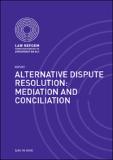| dc.description.abstract |
Reseña:This Report forms part of the Commission‘s Third Programme of Law Reform 2008-20141 and follows the publication of its Consultation Paper on Alternative Dispute Resolution.2 The Report contains the Commission‘s final recommendations in this area. The main alternative dispute resolution (ADR) processes are mediation and conciliation, and the Consultation Paper and this Report have focused on these. The Commission recommends in this Report that a Mediation and Conciliation Act should be enacted to provide a clear framework for mediation and conciliation, and the Appendix contains a draft Mediation and Conciliation Bill to give effect to the Commission‘s recommendations. In that respect, the Commission places significant emphasis on the key principles involved in ADR, including its voluntary nature, the need for confidentiality, its efficiency and the transparency and quality of the process. The Commission is also conscious that a number of related processes have also emerged in specific areas, such as collaborative practice in the family law setting and early neutral evaluation in the context of personal injuries. While the Report and draft Bill therefore concentrate on providing a legislative framework for mediation and conciliation, the Commission has also had regard to these emerging developments. |

